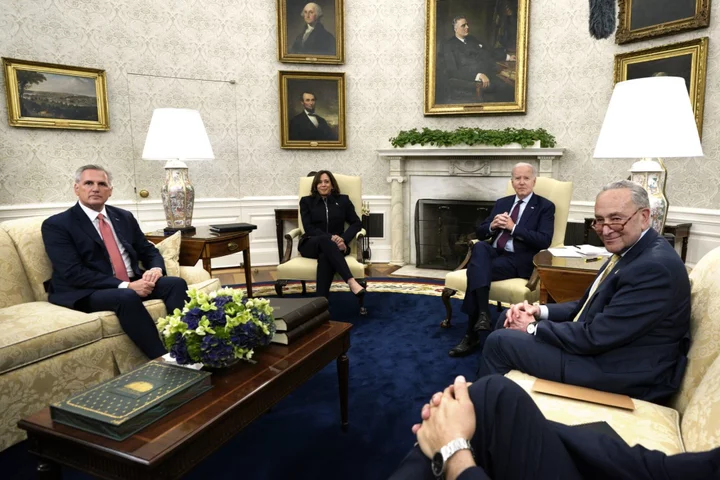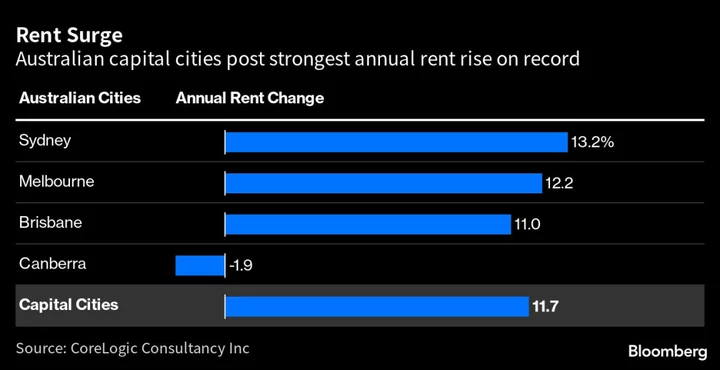Debt-ceiling talks between White House and congressional aides are set to intensify as negotiators seek a framework agreement for Joe Biden and House Speaker Kevin McCarthy to review upon the president’s return from a truncated trip to Asia.
The latest round of talks, launched before Biden’s departure Wednesday for a Group of Seven meeting in Hiroshima, Japan, will feature a narrower group of negotiators in hopes of yielding a deal to avert an unprecedented US default.
Biden said he would call lawmakers and staff to remain apprised of the negotiations during his time abroad, and hopes to gather with congressional leaders once he is back in the country next week. The president intended to visit Australia and Papua New Guinea, but scrapped those stops in hopes of brokering an agreement.
The president and lawmakers struck a cautiously optimistic tone following a meeting Tuesday, saying that while the two sides remained far apart, they were hopeful the new negotiating teams could find bipartisan middle ground. The Treasury Department is warning that the nation faces the disastrous prospect of default as soon as June 1.
Wall Street showed fresh anxiety Tuesday about Washington’s ability to prevent a historic default with both stocks and bonds falling. Yields rose across the US curve, with the rate on 30-year notes climbing to around 3.9% — the highest since the turmoil affecting regional banks that erupted in early March.
Read More: Debt Deadlock Spurs Late-Day Slide in US Stocks: Markets Wrap
The hope on competing ends of Pennsylvania Avenue is that the two sides can avoid calamity by delegating responsibility to a smaller group — many of whom are known as negotiators able to strike deals. Senior White House adviser Steve Ricchetti, legislative affairs director Louisa Terrell and budget director Shalanda Young will represent Democrats in staff-level negotiations, while Representative Garret Graves of Louisiana as well as aides to the speaker will join from the Republican side.
“There was an overwhelming consensus, I think, among the congressional leaders that defaulting on the debt is simply not an option,” Biden said in remarks following the meeting. But the president cautioned, “there’s still work to do.”
McCarthy has agitated for narrower talks in recent days, and said Tuesday a deal could come together quickly.
“We’ve got a lot of work to do,” McCarthy told reporters. “It is possible to get a deal by the end of the week. It’s not that difficult to get to an agreement.”
Senate Majority Leader Chuck Schumer said he was more optimistic than he had been last week, while House Minority Leader Hakeem Jeffries praised an “open, honest, and cordial discussion.”
“The bottom line is that we all came to agreement that we were going to continue discussions,” Schumer said.
Still, sizable obstacles remain for the two sides to raise the federal spending limit. Failure to reach a deal will likely push the US over its debt ceiling as soon as next month, triggering a default that could rock global financial markets, raise borrowing costs for the government, companies and consumers and imperil an economic expansion that’s already begun to show signs of weakening.
Read More: Biden Drops Australia, Papua New Guinea Visit for Debt Talks
Australian Prime Minister Anthony Albanese, who Biden called Tuesday to cancel his visit, said the American president expressed frustration with Republican lawmakers.
“He’s very disappointed at some of the actions” of lawmakers in the US House and Senate, ” Albanese told an Australian radio station.
An eventual agreement would likely rely on votes from Democrats and Republicans, White House Communications Director Ben LaBolt said in an interview with MSNBC on Tuesday night.
“We think the path forward is really finding a budget framework that can pass both chambers, that members of both parties are going to happen to — going to need to vote for, and we need a majority of those votes,” LaBolt said.
McCarthy earlier Tuesday held a closed-door meeting with fellow House Republicans, urging them to stick together on their demands, according to a person familiar with their discussion. McCarthy has said he hopes to have a deal in hand by the weekend, an acknowledgment of the difficult legislative path in the House, where Republicans have a razor-thin majority.
Before the White House meeting, the House speaker publicly dug in on demands for spending cuts and other priorities such as expanding work requirements for federal aid to the poor. Republicans are seeking to add new work requirements for Medicaid for “able-bodied” adults without children as well as apply existing work requirements to older individuals who receive food stamps.
Biden has rejected work requirements on Medicaid but otherwise avoided a definitive response.
“He will not accept proposals that take away people’s health care, health coverage,” White House Press Secretary Karine Jean-Pierre told reporters Tuesday.
--With assistance from Jordan Fabian, Billy House, Erik Wasson and Josh Wingrove.









